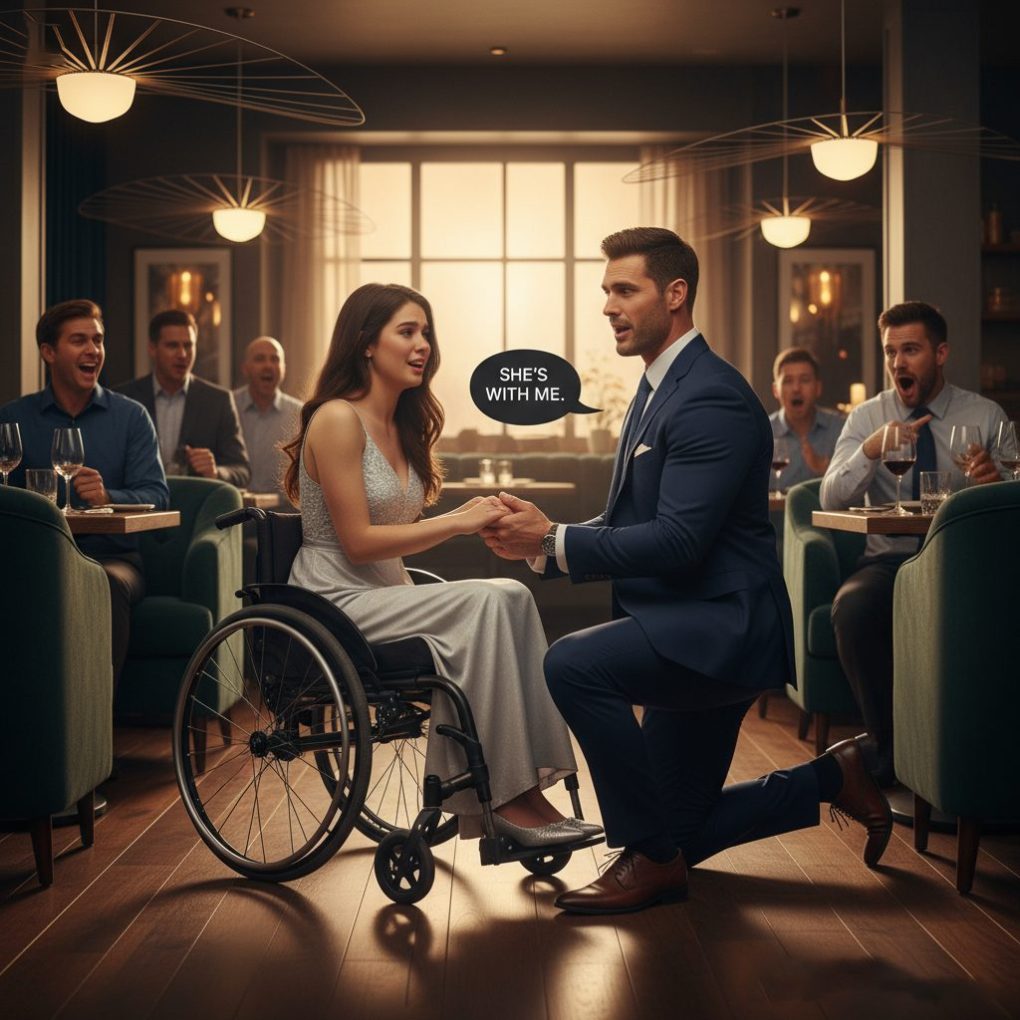They Set Up the Paralyzed Girl as a Joke on a Blind Date—Until the Single Dad CEO Took Her Hand and… Said “She’s With Me”
They Set Up the Paralyzed Girl as a Joke on a Blind Date—Until the Single Dad CEO Took Her Hand and… Said “She’s With Me”…
They thought it would be funny — setting up a paralyzed woman on a blind date as a cruel joke. But when she rolled into that fancy restaurant, and the single dad CEO everyone admired stood up, took her hand, and said, “She’s with me,” nobody laughed again. Read till the end.
The clinking of glasses and low jazz filled The Harbor Lounge, one of Seattle’s most exclusive restaurants. Emma Hayes had spent the entire afternoon rehearsing how to smile without trembling. Her wheelchair hummed quietly as she moved through the doorway, her heart pounding against the fabric of her dress.
Her best friend, Lila, had convinced her to go on a blind date — someone named “Jack,” a friend of a friend. Emma, paralyzed from the waist down after a car accident two years ago, hadn’t been on a date since. She wanted to believe there were still kind people in the world.
But the truth hit her the moment she saw three men snickering at a table near the back. One of them — her supposed date — smirked when he saw her. “You’ve got to be kidding me,” he whispered to his friends, loud enough for Emma to hear. Laughter followed.
Her throat closed. The air around her thickened. Every muscle in her body begged her to turn and leave. But before she could, a man’s voice cut through the noise.
“Emma Hayes?”
She turned. A tall man in a tailored navy suit stood by the entrance — Jack Miller, CEO of MillerTech, the single father the city’s business magazines wouldn’t stop talking about. But instead of confusion or pity, there was recognition in his eyes.
“I’m Jack,” he said softly. Then, without hesitation, he walked toward her, ignoring the whispers that rippled through the room. He knelt beside her chair, smiled, and extended his hand.
“She’s with me,” he said clearly.
The laughter stopped.
Emma stared at him, speechless, as he helped guide her wheelchair to a corner table overlooking the harbor. He ordered dinner without missing a beat, his voice calm, unbothered.
And for the first time in a very long while, Emma didn’t feel invisible.
Jack Miller wasn’t supposed to be there that night. He had canceled three meetings, rearranged his schedule because his seven-year-old daughter had begged him to start dating again. He expected an ordinary evening — polite conversation, maybe awkward laughter. Not this.
But when he saw Emma, something in him shifted. She wasn’t fragile — she was fighting. The way she kept her chin up even after that cruel scene told him everything about her strength.
“Don’t let them win,” he said quietly as the waiter poured wine. Emma blinked back tears. “You don’t even know me,” she whispered.
Jack smiled. “I know courage when I see it.”
Their dinner stretched into hours. They spoke about music, childhood, second chances. Emma told him about her accident — how a drunk driver had taken her legs but not her will to finish her degree in art therapy. Jack told her about losing his wife three years ago, and raising his daughter, Sophie, alone.
By the time dessert arrived, the restaurant had thinned out, leaving only the sound of waves tapping against the dock.
“Do you ever wish you could go back?” Emma asked.
Jack shook his head. “No. I wish I could go forward — with people who make the pain mean something.”
That sentence lingered between them like the soft light on the water.
When he dropped her home that night, he walked her to her door. “You know,” he said, “if someone ever laughs at you again, tell me. I’ll make sure they never forget who you are.”
Emma laughed for the first time that evening — a real laugh, full of life.
In the weeks that followed, Jack kept calling. Sometimes for coffee, sometimes just to check on her therapy progress. And sometimes, when words failed, he simply showed up — with Sophie, with flowers, with quiet strength that didn’t ask for anything in return.
Months passed. What began as friendship turned into something neither of them dared name. Jack would push her wheelchair through the park while Sophie ran ahead chasing ducks. Emma painted again, her hands steady, her heart lighter.
One afternoon, during Sophie’s school art fair, Emma displayed her first full collection — paintings inspired by resilience, color, and hope. Jack stood beside her, proudly watching as people stopped, admired, and bought her work.
When the mayor came to shake Emma’s hand, those same men who once mocked her stood awkwardly in the crowd, silent.
Later, as the sun melted into the skyline, Jack turned to her. “You changed the way I see strength,” he said.
“And you changed the way I see love,” she whispered.
He smiled, then leaned closer, his hand resting gently over hers. “Emma,” he said, voice low, “You’re the bravest woman I’ve ever known. And if you’ll let me… I’d like to walk — or roll — through life with you.”
Her eyes filled with tears, but this time they were tears of peace, not pain.
She nodded. “You already are.”
The crowd around them disappeared. The noise of the city faded. All that remained was the feeling of two people who had been broken — and somehow, found healing in each other.
From that day forward, Emma didn’t let fear define her. She lectured at local universities about disability inclusion and was later featured in Forbes for her community art program. Jack, ever the quiet supporter, stood by her side, never overshadowing her, just holding space where she could shine.
Sometimes love doesn’t come from fairy tales — it comes from moments of courage, from hands that don’t let go when the world looks away.
And every year, on the anniversary of that night at The Harbor Lounge, Jack would whisper the same words that changed everything:
“She’s with me.”






